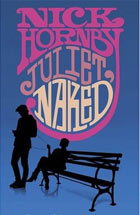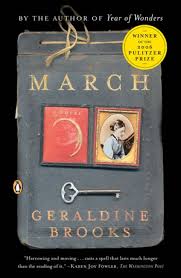Jim Shepard is the author of six novels, including most recently PROJECT X, and three story collections, including most recently LIKE YOU’D UNDERSTAND, ANYWAY, which was nominated for the National Book Award and won The Story Prize. His short fiction has appeared in, among other magazines, Harper’s, McSweeney’s, The Paris Review, The Atlantic Monthly, Esquire, Granta, Tin House, The New Yorker and Playboy. He teaches at Williams College.
Saturday, September 19, 2009
"Five Great Stories that grab you."
Jim Shepard is the author of six novels, including most recently PROJECT X, and three story collections, including most recently LIKE YOU’D UNDERSTAND, ANYWAY, which was nominated for the National Book Award and won The Story Prize. His short fiction has appeared in, among other magazines, Harper’s, McSweeney’s, The Paris Review, The Atlantic Monthly, Esquire, Granta, Tin House, The New Yorker and Playboy. He teaches at Williams College.
Nick Hornby's newest book

"Have you got the camera, Annie?" said Duncan.
"Yes. But what do you want a picture of ?"
"Just, you know . . . "
"No."
"Well . . . the toilet."
"What, the . . . What do you call those things?"
"The urinals. Yeah."
"Do you want to be in it?"
"Shall I pretend to have a pee?"
"If you want."
So Duncan stood in front of the middle of the three urinals, his hands placed convincingly in front of him, and smiled back over his shoulder at Annie.
Saturday, September 12, 2009
Another great handbook for Writers!

The Handbook for Writers in Prison can also be ordered on behalf of a friend or loved one who is incarcerated, though we encourage you to make a $5 donation to the Prison Writing Program. Your support will not only help us publish future editions of this Handbook but will also help provide hundreds of inmates across the country with skilled writing teachers and audiences for their work.
Thursday, September 10, 2009
Interview with Krissie Williams
What inspired you to write your first book?

I don’t think anything or anyone specifically inspired me to write. One day, I decided to challenge myself by seeing if I could build a story surrounding events that occur to people in everyday life.
Is there a message in your novel that you want readers to grasp?
Yes! There are several messages. First, life is a journey. No one can do this alone. If you feel like jumping ship (and chances are you are not the only one, lol) ask for help. Also, it is important to remember to laugh at yourself and others along the way.
Are experiences based on someone you know, or events in your own life?
Adventures in Martyrdom is a fictional story, but like most writers there are some characters and events in the book that are loosely based on my own personal experiences.
What are your current projects?
Oh, I am so excited about my current project. I am finishing a mystery titled Breath. It is really stretching me as a writer. If you thought the characters in Adventures had issues, wait until you read this one. Also, some readers have expressed interest in seeing a sequel to Adventures.
What books have most influenced your life most?
There are two books: The Bluest Eye by Toni Morrison and The Autobiography of Malcolm X. I can reread those books over and over and get a different interpretation and insight every time.
What book are you reading now?
Believe it or not, I recently finished reading Harry Potter and the Half-Blood Prince. I admire J.K. Rowling. I wanted to finish it before the movie hit the theatres this summer. As a rule though, I am trying not to read other authors’ books when I’m currently writing a heavy chapter in my own book. It’s just my process.
Who is your favorite author and what is it that really strikes you about their work?
Funny, I don’t think I have a favorite author. I go through phases. I am connecting to Dan Brown right now. He can really write a page turner. Depending on where I am emotionally and mentally in my own life, different authors speak to me at different times.
Do you have anything specific that you want to say to your readers?
Keep reading and laughing! Also, I want to hear your thoughts! I write for avid readers like you! Here is my contact info below!
Blog, follow me, send me a message:
facebook (Krissie the Author),
twitter (Krissie Williams)
krissiekatrese@gmail.com
Adventures in Martyrdom from Small Dogma Publishing
Available for purchase now at: www.smalldogma.com
Coming soon to amazon.com and select bookstores
Kamby Bolongo Mean River

KAMBY BOLONGO MEAN RIVER
by Robert Lopez
KAMBY BOLONGO MEAN RIVER EVENT DATES
Sat, 9/12, Barbes, Brooklyn, NYMon, 9/14, River Run Bookstore, Portsmouth, NH
Tue, 9/15, Schoen Books, South Deerfield, MA
Wed, 9/16, Brookline Booksmith, Boston, MA
Thu, 9/17, Myopic Books, Providence, RI
Fri, 9/18, Clinton Bookshop, Clinton, NJ
Sat, 9/19, 510 Readings, Baltimore, MD
Sun, 9/20, The Dive Bar, Philadelphia, PA
All of the above with Sam Ligon, (Drift and Swerve) and Blake Butler, (Scorch Atlas)
Oct 4th, FreeBird Books, Brooklyn, NY
Oct 17th, KGB Bar, NY, NY (with Laura van den Berg)
Oct 27th, Pacific Standard, Brooklyn, NY (with Victor Lavalle)
Oct 28th, McNally Jackson, NY, NY (with Hesh Kestin)
Nov 15th, Sunday Salon, NY, NY (with Joe Salvatore and TBA)
Dec 16, Mixer at Cakeshop, NY, NY (with TBA)
Bill Cotter
Fever Chart

“Bill Cotter’s Fever Chart proves there is still fresh wit and fierce life in the American tongue. Read this book." —Wells Tower
“As a blurber I am required to say ‘Edgar Rice Burroughs meets Thomas Pynchon’ or ‘George Saunders meets Mickey Spillane.’ But the truth is I’m not sure who’s meeting whom. All I know is they’re meeting on a teacup ride in a seedy amusement park, a teacup ride that has miserably failed its inspection, making the experience pleasantly familiar but alarmingly skewed, full of fun but deadly dangerous. You’ll be dizzy when it’s over if it doesn’t fly apart and chop your head off. But the ride is worth it.” —Jack Pendarvis
Sunday, September 6, 2009
Discover Great New Writers
Saturday, September 5, 2009
Kristin Hannah

EXCERPT
CHAPTER ONE
They used to be called the Firefly Lane girls. That was a long time ago—more than three decades—but just now, as she lay in bed listening to a winter storm raging outside, it seemed like yesterday.
In the past week (unquestionably the worst seven days of her life), she’d lost the ability to distance herself from the memories. Too often lately in her dreams it was 1974; she was a teenager again, coming of age in the shadow of a lost war, riding her bike beside her best friend in a darkness so complete it was like being invisible. The place was relevant only as a reference point, but she remembered it in vivid detail: a meandering ribbon of asphalt bordered on either side by gullies of murky water and hillsides of shaggy grass. Before they met, that road seemed to go nowhere at all; it was just a country lane named after an insect no one had ever seen in this rugged blue and green corner of the world.
Then they saw it through each other’s eyes. When they stood together on the rise of the hill, instead of towering trees and muddy potholes and distant snowy mountains, they saw all the places they would someday go. At night, they sneaked out of their neighboring houses and met on that road. On the banks of the Pilchuck River they smoked stolen cigarettes, cried to the lyrics of “Billy, Don’t Be a Hero,” and told each other everything, stitching their lives together until by summer’s end no one knew where one girl ended and the other began. They became to everyone who knew them simply TullyandKate, and for more than thirty years that friendship was the bulkhead of their lives: strong, durable, solid. The music might have changed with the decades, but the promises made on Firefly Lane remained.
Best friends forever.
They’d believed it would last, that vow, that someday they’d be old women, sitting in their rocking chairs on a creaking deck, talking about the times of their lives, and laughing.
Now she knew better, of course. For more than a year she’d been telling herself it was okay, that she could go on without a best friend. Sometimes she even believed it.
Then she would hear the music. Their music. “Goodbye Yellow Brick Road.” “Material Girl.” “Bohemian Rhapsody.” “Purple Rain.” Yesterday, while she’d been shopping, a bad Muzak version of “You’ve Got a Friend” had made her cry, right there next to the radishes.
She eased the covers back and got out of bed, being careful not to waken the man sleeping beside her. For a moment she stood there, staring down at him in the shadowy darkness. Even in sleep, he wore a troubled expression.
She took the phone off its hook and left the bedroom, walking down the quiet hallway toward the deck. There, she stared out at the storm and gathered her courage. As she punched in the familiar numbers, she wondered what she would say to her once-best friend after all these silent months, how she would start. I’ve had a bad week… my life is falling apart… or simply: I need you.
Across the black and turbulent Sound, the phone rang.
Geraldine Brooks
The Pulitzer-Prize winning novel by Geraldine Brooks, March was recently highly recommended to me as a possible book club read. Here's some background information about the book and author. Check out a few discussion questions I found on the web specifically for clubs. Enjoy!
March was awarded the 2006 Pulitzer Prize for literature. It is truly deserving. The novel is engaging as a story, on an historical level, and as a continuation of a well-loved favorite. That Ms. Brooks spent a considerable amount of time researching the period and life in the south during the Civil War is apparent. Rarely is an important work so entertaining. I highly recommend March.
About Geraldine Brooks: Geraldine Brooks is the Australian-American author of four novels. Born and raised in Sydney, she graduated from Columbia University and worked as a reporter for the Wall Street Journal. She lives in Virginia with her husband, Pulitzer Prize winner Tony Horowitz, and their son.
Discussion Questions for March
- The causes of the Civil War are many. How are these issues illustrated in the novel?
- Mr. March's relationships with Grace and Marmee are pivotal in his life. Discuss the difference in the two relationships and what Mr. March learned from each.
- Communication seems to have been a problem between Mr. and Mrs. March. Cite examples of this difference in expectation and reality.
- Mr. March left for the war with an idealist's point of view. How did his view of the war change during the year he was away.
